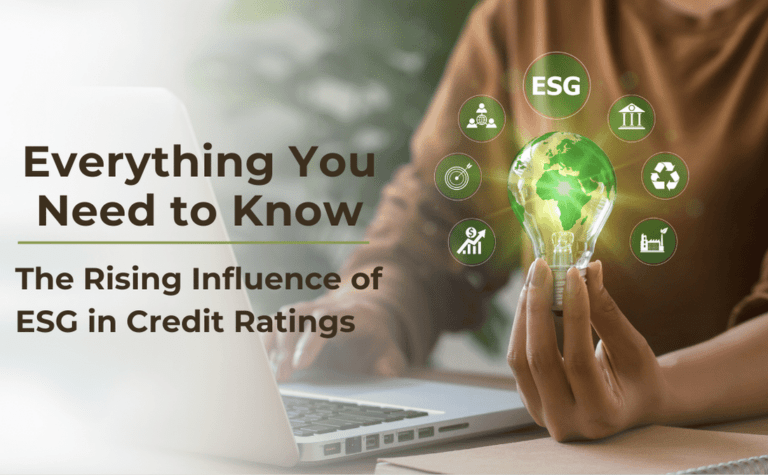
The Rising Influence of ESG in Credit Ratings: Everything You Need to Know
Sustainability and ethical practices have become an essential element of a company’s growth in the long term. The evaluation in today’s landscape is not just based on the financial profile of the company but also on the management of ESG risks.
ESG – Environmental, Social, and Governance Ratings play an important role in assessing a company’s sustainable and environmental initiatives along with its social practices.
With ICRA ESG ratings, companies elevate their reputation and attract potential investment that aligns with their sustainability practices. Investors and stakeholders have a clear picture of a company’s overall performance, along with its sustainability and ethical outcomes. ESG ratings also drive investors towards sustainability by managing potential risks associated with it through well-defined decision-making processes.
This impact of ESG ratings is not just on the environment but also encourages companies to strive for sustainability and adopt ethical practices further fostering responsible investment.
How ESG ratings are evaluated
A comprehensive evaluation of a company’s profile and performance is done across all three aspects to give it an ESG rating. A specific metric is used to assess environmental sustainability, social responsibility, and governance practices.
Let us take a look at how these criteria are taken into account-
Environmental Evaluation – This is a reflection of impact on the environment by the company along with a demonstration of their efforts to operate sustainably. The evaluation is done across various areas with a key focus on carbon emissions and climate change mitigation, energy efficiency, resource management, and environmental compliance. The data is further used from various sources to give a score to each of the factors thereby reflecting the commitment of the company towards sustainability and responsible environmental practices.
Social Evaluation – With a focus on a company’s relationship management with its employees, customers, and the broader community. This evaluation is done to promote better ethical practices and foster positive societal impact. The assessment is done on labor practices and employee well-being, human rights, customer relations, and community engagement. This is required to ensure that safe working conditions along with fair labor practices are implemented for the well-being of the employees along with the prevention of unethical practices such as child labor and exploitation.
Governance Evaluation – A key aspect of governance evaluation is that it examines a company’s leadership along with its decision-making process while making sure of its adherence to ethical standards. It reflects a company’s balanced independent board, its respect for accordance with shareholder rights, and its transparency and accountability while managing its operations. Governance evaluation is held to give a clear picture of ethical principles that are supported by the company.
ESG Ratings by ICRA
ICRA ESG Ratings provide a benchmark for evaluating value and sustainability in the long term by providing an in-depth analysis of a company’s ESG aspects. In a world where financial metrics are given more importance, the role of ESG ratings can’t be overlooked as they promote responsible business practices.
For more info Visit here: www.icrallc.com
